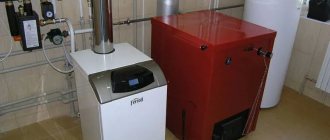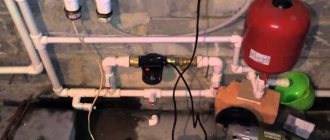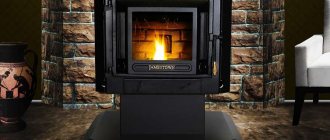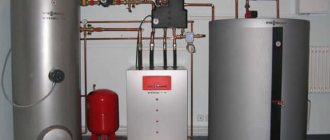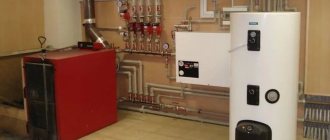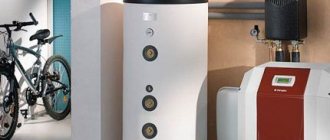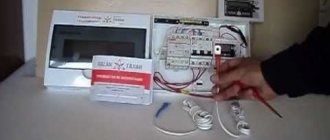Selection of a boiler for heating heating equipment
Many visitors to the Technodom online store contact us with a request to select heating boilers online. We are always ready to help them in this matter, especially since our company’s range includes many different types and models of equipment suitable for literally any purpose. For example, if you need to select a gas boiler based on its parameters, our consultants will be happy to provide you with all the necessary information. Before you start choosing heating equipment, it is advisable to determine which criteria will be most important for you.
Selection of a boiler according to parameters (area, power, type of fuel)
Very often, people select a gas boiler for a private home based on the area and volume of the room. This principle works effectively with other types of boilers. Having such data, you can determine the optimal equipment power for your building. It is believed that ideal indicators should be 100 watts per 1 sq. meter of area. If you need to select a boiler for a private home, the price of this equipment can also be of considerable importance
Finally, we advise you to pay attention to the type of fuel - and purchase just such a boiler, the use of which will be the most profitable and less expensive for you
Selection of gas heating boiler
For many of those who select a gas boiler based on parameters, the cost of this equipment can be very important, but far from the only factor. In addition, it is worth determining its location - whether it will be wall-mounted or floor-mounted. An equally significant factor is its energy dependence; the equipment can be autonomous or must be connected to the mains. Finally, these models are single-circuit and double-circuit, the first provide only heating, and the second provide heating and hot water heating. The staff will be happy to help you understand all these subtleties.
Selection of an electric heating boiler
In addition to selecting a gas boiler for a private home according to its parameters, our clients are also interested in other types of these devices. For example, electric models are very popular. Such boilers must be selected according to their power (this is a universal parameter for any model), type of connection (220V or 380V), principle of power control (stepped or smooth), as well as heating method (heating element or electrode)
Each of the listed criteria can play a rather important role, therefore, we recommend paying increased attention to all of them
Selection of solid fuel heating boiler
Solid fuel heating boilers are no less common; many visitors to the Technodom online store want to purchase this particular type of product
When choosing them, we advise you to pay attention to the fuel used by the boiler (coal, firewood, pellets, pyrolysis boilers are quite successful), the method of loading it (automatic or manual), the heat exchanger material, the volume of the combustion chamber, energy consumption, etc. We will also be happy to help you choose a double-circuit boiler for an indirect heating boiler
Scope and characteristics of boilers
As a rule, a floor-standing gas heating boiler is installed in large cottages. The average size of the area for which such units are enough to heat is 500 square meters. m, and the power is about 50–70 kW (maximum power value is 1000 kW).
The efficiency of the equipment is quite high - usually at least 90%. Weight can reach 150 kg - floor-standing gas boilers are among the heaviest heating devices.
Such boilers are usually purchased from online services, where there is a good selection and affordable prices. In addition, if you contact TeplovodService to purchase a floor-standing gas boiler (Baxi, Navien or other well-known manufacturers of which our company is a dealer), then here you will also find an official two-year guarantee and delivery of the boiler on the day of purchase .
We select a boiler according to different parameters
Now it’s time to talk about how to select a heating boiler according to its parameters. These parameters include the area of heated premises and the power of heating equipment.
Let's look at how to make the right selection of a heating boiler based on area. There are several points to consider:
- If your house is insulated according to the standards, its ceilings are 3 m, then the power will be determined at the rate of 1 kW per 10 sq.m.
- If the house is not insulated in the best way, or verandas and uninsulated attics are heated, then the power will be greater.
- If the boiler will be used not only to heat the house, but also to supply hot water, then the power will be increased by 20-50%.
Of course, if you do not have certain special knowledge, then you will only make an approximate choice of heating boiler power. After all, if you apply a more complex formula, then some more indicators are included.
Boiler power depending on the area of the house
Let's consider the formula for calculating the power of a heating boiler. Boiler power is the most important operating parameter. This does not depend on what type of fuel will be used in the future. If the power is not enough, you will freeze; if, on the contrary, you buy a device that is too powerful, then you will overpay.
To select the power of a heating boiler, consider the formula. So, this includes the following parameters:
- Room area S.
- Specific boiler power per 10 sq.m of premises Wud. – taking into account climatic conditions: Moscow and the region – 1.5 kW, North – 1.5 – 2 kW, South – 0.7 – 0.9 kW.
The formula will look like this: Boiler power = SWud./10.
When choosing a boiler, first of all it is necessary to calculate the energy demand of the heating object. The parameters of the heating system are calculated according to the heat loss of the room, which depends on the size of the room, the thermal conductivity of external walls, internal partitions and ceilings, the difference between external and internal air temperatures, therefore the final determination of the boiler power should be trusted only to professional heating engineers. But it is possible to pre-determine the power of the boiler, and accordingly, the cost of the equipment and its other parameters independently. Approximately, you can use the following ratio - 1.2 kW of boiler power is required to heat approximately 10 m2 of a well-insulated room with a ceiling height of up to 3 m.
The defining parameters that should be relied upon when calculating power are:
- area of the heated room (S);
- specific boiler power per 10m? premises, which is set taking into account amendments to the climatic conditions of the region (W spec.).
There are generally accepted specific power values for climatic zones:
- for the Moscow region - W beat. = 1.2 - 1.5 kW;
- for the Northern regions - W beat. = 1.5 - 2.0 kW;
- for the Southern regions - W beat. = 0.7 - 0.9 kW.
Calculation of boiler power (W cat) is carried out according to the formula:
W cat. = SW beat / 10
Often, for the convenience of calculations, the average value of W beat is used. equal to one. Based on this, it is customary to choose the boiler power at the rate of 10 kW per 100 m 2 of heated space.
Example:
1. Area of the heated room S = 100 m²;
2. Specific power (Wsp.) for the Moscow region = 1.2 kW;
W cat. = 100 1.2 / 10 = 12 kW;
The table shows the approximate power of boilers depending on the area of the house served (for the Moscow region).
What to follow
When asked how to choose a heating boiler, they often answer that the main criterion is the availability of a particular fuel. In this context, we will highlight several types of boilers.
Gas boilers
Gas boilers are the most common types of heating equipment. This is due to the fact that fuel for such boilers is not very expensive and is available to a wide range of consumers. What types of gas heating boilers are there? They differ from each other depending on what type of burner is atmospheric or inflatable. In the first case, the exhaust gas goes through the chimney, and in the second, all combustion products escape through a special pipe using a fan. Of course, the second version will be a little more expensive, but it will not require smoke removal.
Wall-mounted gas boiler
As for the method of placing boilers, the choice of heating boiler involves the presence of floor and wall models. Which heating boiler is better in this case - there is no answer. After all, everything will depend on what goals you are pursuing. If, in addition to heating, you need to supply hot water, then you can install modern wall-mounted heating boilers. This way you won’t need to install a boiler to heat the water, and this will save money. Also, in the case of wall-mounted models, combustion products can be discharged directly onto the street. And the small size of such devices will allow them to fit perfectly into the interior.
The disadvantage of wall-mounted models is their dependence on electrical energy.
Electric boilers
Next, we will consider electric heating boilers. If there is no mains gas in your area, an electric boiler can save you. These types of heating boilers are small in size, so they can be used in small houses, as well as in cottages with an area of 100 sq.m. All combustion products will be harmless from an environmental point of view. And installation of such a boiler does not require special skills. It is worth noting that electric boilers are not very common. After all, fuel is expensive, and its prices are rising and rising. If you are asking which heating boilers are better in terms of economy, then this is not an option in this case. Very often, electric boilers serve as backup heating devices.
Solid fuel boilers
Now it’s time to consider what solid fuel heating boilers are available. Such boilers are considered the most ancient; such a system has been used for heating premises for a long time. And the reason for this is simple - fuel for such devices is available, its quality can be firewood, coke, peat, coal, etc. The only drawback is that such boilers are not able to operate in autonomous mode.
Gas generating solid fuel boiler
A modification of such boilers is gas generator devices. This boiler differs in that it is possible to control the combustion process, and the productivity is regulated within the range of 30-100 percent. When you are thinking about how to choose a heating boiler, you should know that the fuel that such boilers use is wood, and their humidity should not be less than 30%. Gas fired boilers depend on the supply of electrical energy. But they also have advantages over solid fuel ones. They have high efficiency, which is two times higher than solid fuel devices. And from the point of view of environmental pollution, they are environmentally friendly, since combustion products will not enter the chimney, but will serve to generate gas.
The rating of heating boilers shows that single-circuit gas generator boilers cannot be used for heating water. And if we consider automation, it is great. You can often find programmers on such devices - they regulate the temperature of the coolant and give signals if there is an emergency.
Gas generator boilers in a private home are an expensive pleasure. After all, the cost of a heating boiler is high.
Liquid fuel boilers
Now let's look at liquid fuel boilers. Such devices use diesel fuel as a working resource. To operate such boilers, you will need additional components - fuel containers and a room specifically for the boiler. If you are thinking about which boiler to choose for heating, then we note that liquid fuel boilers have a very expensive burner, which can sometimes cost as much as a gas boiler with an atmospheric burner. But such a device has different power levels, which is why it is profitable to use it from an economic point of view.
In addition to diesel fuel, liquid fuel boilers can also use gas. For this purpose, replaceable burners or special burners are used that can operate on two types of fuel.
Liquid fuel boiler
Popular manufacturing companies
There are several reputable manufacturers that are preferred by clients:
- Stropuva - a Lithuanian brand that provides longer burning from one load of firewood. It has an interesting barrel-shaped design, which makes it possible to install the device in a small room. Lithuanian devices are quite expensive, but they are durable.
- Zota - for those who like to use firewood as fuel, the Russian brand is suitable. The devices are small in size and low in power. But they are also reliably constructed and affordable.
- Burzhuy-K is a Russian company that produces boilers independent of power supply, operating on pyrolysis. The cost of boilers varies from 40,000 to 76,000 rubles. The boilers have high power and retain heat for a long time.
What type of gas boiler to choose for a cottage
- The principle of operation is that modern gas boilers for cottages use condensation heating of the coolant. The efficiency of condensing equipment reaches 108%. The optimal use of boilers of this type is low-temperature heating systems (warm floors).
- The combustion chamber type is atmospheric boilers, they have a classic design. The air is supplied from the room in which the boiler equipment is installed. Equipment with a closed combustion chamber has greater efficiency. Air intake and combustion products removal are carried out through a coaxial pipe.
- Energy dependence - the operation of classic-type gas boilers does not depend on the availability of electricity. Turbocharged and condensing models of heating devices, with a closed combustion chamber, as well as equipment using a microprocessor controller, depend on the availability of electricity in the network.
How many contours should there be?
- Single-circuit models - the internal device contains one heat exchanger designed to heat the heating fluid of the heating system. Boilers have high productivity. To heat hot water, you need to connect an external storage boiler. Installing a single-circuit gas boiler in a cottage is justified only in the case of a large heated area of the premises, when there is no need to heat hot water or it is planned to additionally install a storage tank.
- Double-circuit models - boilers are equipped with two heat exchangers:
- The primary circuit is made of steel and works to heat the coolant in the heating system.
The secondary heat exchanger is a copper coil (an alloy of several metals can also be used in production). Hot water is heated using a flow method.
- Boilers with built-in storage boiler. The main disadvantage of dual-circuit equipment is that heated water is supplied to the consumer not immediately after opening the tap, but after a few minutes. This problem is easily solved thanks to the container provided inside the housing, which is similar in structure to a boiler. The required heating temperature of the liquid is automatically maintained in the storage tank. The container is connected to the recirculation system. Hot water is supplied to the consumer immediately after opening the tap.
Double-circuit gas boilers for cottages have less power compared to single-circuit analogues, but are quite convenient to use.
Which type of accommodation is better?
A stationary boiler - floor installation has one significant advantage - there are almost no restrictions on the weight of the structure. This feature allows you to install all the necessary equipment of proper quality during production.
As a rule, floor-standing models have a longer service life than wall-mounted versions.
Wall-mounted boiler - has modest dimensions and does not take up much space after installation, which is especially important if a small boiler room is used. During installation, the load on the load-bearing wall increases significantly, therefore, the manufacturer strives to lighten the structure
For this purpose, lightweight metal alloys are used in production, which affects the service life.
What can be replaced
Today there are many options for heating your home and obtaining warm water supply, even without using a boiler. In particular, these are devices that allow you to efficiently and efficiently heat a home. Basically, they run on the energy generated when fuel burns, turning it into heat. Thanks to this, the room is filled with heat.
Most often the boiler is replaced:
- steam system powered by main heating;
- autonomous gas or electric system;
- stove heating, for which any fuel is used;
- fireplace;
- autonomous heating system powered by the sun or wind;
- air conditioning.
You can choose your own heating and combine it, from radiators and pipes to a fireplace and a portable heater.
Let's consider each presented type of heating system used to replace the boiler.
- Stove or fireplace. Both devices heat the room and water by burning wood or coal. To organize such a heating system, you will have to make a stove or buy a ready-made communication system and install it correctly. As a result, you can get economical and environmentally friendly equipment for heating, cooking and heating water. In this case, the stove can be made of brick or metal and immediately heat adjacent rooms.
- Air conditioner. Not many people realize that an air conditioner heats the air well during the cold season. Moreover, its installation will require a minimum amount of time, unlike a boiler. However, the disadvantage of such equipment is the high cost of maintenance, as well as the heating of a small number of square meters of space.
- Autonomous heating system with pipe and radiator systems connected to it. It can be obtained from the sun using devices called solar collectors. They are capable of converting solar energy into heat for the home. It can also be obtained from the force of the wind using a wind apparatus, consisting of a turntable with a generator and a battery device, or a wind station.
Important! These devices are suitable for efficiently heating a living space that is located away from the gas line. You can warm up even without using a central heating system, pipes with boilers and radiators
This can be achieved by maximizing the insulation of the home, changing the usual wardrobe for the home and psychological heating
You can warm up even without using a central heating system, pipes with boilers and radiators. This can be achieved by maximizing the insulation of the home, changing the usual wardrobe for the home and psychological heating.
Maximum home insulation includes insulating walls, adding heated floors to rooms, massive curtains on window openings, etc. Even when the boiler is operating, such nuances retain heat better and allow you to use the system economically.
Changing your home wardrobe routine includes starting to wear knitted sweaters, using blankets when relaxing, and using warming blankets with heating pads and warm drinks.
Psychological heating includes changing the design of the rooms, changing the overall color scheme of the rooms to warm shades, adding knitted decor and wooden accessories to the room, using aroma candles and taking photos of warm places. So, you can deceive yourself and force your body to psychologically receive heat.
In any case, you can find an option and a way to heat your home without a boiler. Such heating can warm you up even at sub-zero temperatures outside the window. Using the presented methods, you can heat your home even in the most difficult situation.
Selection of heating boiler by price, power, combustion chamber
Dear users of our resource, if this is your first time on our website looking for a heating boiler and you don’t know what kind of boiler you need, then we recommend using the heating boiler power calculation.
Here you can choose a heating boiler based on the fact that you already know what kind of boiler you need, the power of the boiler, where the boiler will be mounted: on the wall or whether it will be floor-mounted and, of course, taking into account the resources available for this. For selection, we suggest you indicate the criteria you need.
More detailed information can be obtained by clicking on the appropriate link as a result of selecting a heating boiler or by calling in Moscow +7(495)48-132-48
Criteria for selecting a heating boiler:
- boiler price
- number of circuits (single-circuit or double-circuit)
- boiler type (wall-mounted or floor-standing)
- combustion chamber (open or closed)
- type of coolant (gas, diesel, electricity)
- boiler power
- boiler voltage (220V, 380V, 220/380V)
In order to find out more detailed information about heating boilers, here is the classification of heating boilers:
by installation method (by installation location):
- floor (cast iron or steel)
- wall-mounted (mounted) (usually run on gas)
by type of energy carrier:
- liquid fuels (diesel, kerosene, fuel oil, etc.)
- solid fuel (solid fuel: firewood, coal, coke, sawdust, fuel briquettes, etc.)
- gas (liquefied gas, natural gas)
- electrical (the energy carrier can be electricity)
- universal (multi-fuel, combined) (energy carriers can be different, depending on the heating boiler)
by number of circuits:
- single-circuit, such boilers are intended only for heating; as a rule, such boilers have the ability to connect an external storage boiler.
- double-circuit (one circuit for heating, the second for hot water supply)
by combustion chamber:
- open, air, namely oxygen for combustion, is taken from the place where the boiler is installed. It must be well ventilated.
- closed, the air is taken, as a rule, from the outside, although such boilers can be converted so that the air is taken from the place where it is installed. Boilers with a closed combustion chamber, in turn, differ from each other in the method of air intake and smoke removal. Those. or with a separate smoke removal system, when two “pipes” approach the boiler - one of which supplies air, and the other removes combustion products. In boilers with a coaxial chimney, which are more compact, there is one pipe inside another. Air is supplied through one, smoke removal is carried out through the other.
according to the material of the main heat exchanger:
by type of burner (burner device):
- inflatable (fan) burner (gas or liquid)
- atmospheric burner (gas)
according to the method of coolant movement:
- natural circulation / gravity (without pump)
- forced circulation (with pump)
according to the amount of voltage required for operation:
by type of coolant:
- liquid (water or antifreeze)
- steam
- air
Power and installation location of a heating boiler for a home
The required boiler power is determined depending on the area of the private house. The smaller the area of the house, the lower the power the boiler can be. It is necessary to take into account heat leakage (heat loss) in the building. Heat can escape through a window or an open window, through the entrance doors. And the building itself can lose heat depending on the quality of its insulation. Therefore, the boiler must be selected with some power reserve.
It is better to entrust the calculation of the power of heating equipment to qualified specialists, but you can calculate it yourself. 1 kW can heat 10 m² of your home. For example, for a house with an area of 200 m² you will need a boiler with a capacity of 23 kW (taking into account a 15% power reserve).
When choosing a boiler, you need to take into account the method and location of its installation. By installation method you need to understand the floor or wall version of the boiler, and by location - the room in which the equipment will be installed
Diagram of a turbocharged boiler.
To install floor-standing models, as a rule, you need to allocate a separate room. This is due, first of all, to the fact that their operation requires many other smaller, but very important devices (pump, expansion tank, pipes, various fittings, taps, etc.). Arranging this mass of appliances and components, for example, in the kitchen is not very convenient. Therefore, a separate room is allocated - the boiler room.
Rating of economical boilers
The TOP includes models that allow for economical use of consumables. Also presented here are models in the optimal combination of price and quality. The rating is based on expert opinions and customer reviews. When choosing the best device, the following characteristics were taken into account:
- Product type. There are gas, electric and universal devices. They differ in cost and functions.
- Power. For a large area, the device must be powerful. A specialist will help you make the calculation correctly.
- Size. To heat a small house, a compact model is sufficient. You also need to take into account the dimensions of the room.
- A heating element. An electric energy-saving heating boiler can have heating elements, induction and electronic elements.
- Price. Designs that are too cheap are short-lived, and those that are too expensive do not always meet their capabilities, so a middle ground was chosen.
When choosing equipment, the area of the house is taken into account. Universal products work with any type of fuel. The review will help determine which boiler is the most economical.
The best heating radiators
Type of operation of heating equipment for a private home
Installation diagram of a solid fuel heating boiler.
Boilers for heating houses differ in the type of their operation. In this case, the design of the boiler (wall-mounted or floor-mounted) does not matter.
Single-circuit models, which are initially intended only to provide heating for a private home, can also be used to heat water for domestic needs (wash dishes, take a shower, etc.), that is, provide your home with hot water supply, but require the addition of additional devices and components , such as pumps and indirect heating boiler. Such a boiler room design requires a separate room due to its dimensions, but it makes it possible to choose the equipment that is suitable for your home.
Double-circuit boilers for home heating are very popular, which are initially intended for both heating and providing hot water supply. A unit is already built into the body of such devices, which provides heating of water for domestic needs, which saves space in the room, but narrows the choice of equipment. For example, the power of the built-in hot water supply unit is designed for 2 simultaneously operating points, and you have more than 2 of them.
In addition, chimney and flueless boilers are available on the market. When any type of fuel (except electricity) is burned, combustion products are released in the form of smoke. These products must be discharged into the chimney. The chimney itself must be separate for the boiler and installed above the roof of the house. Such equipment cannot operate without a chimney.
Chimneyless models are often called turbocharged. Combustion products are removed using a special fan (turbine). A chimney for such models is still necessary, but it is installed differently: not vertically and not higher than the roof of the building, but is discharged horizontally through the wall. A chimney of this type is called coaxial, and its length is 50 cm or more. If a chimney was not provided in your home, then choosing such equipment allows you to save significantly.
Single-circuit and double-circuit floor-standing boilers
The basic function of any boiler is to heat the coolant for the heating circuit. All models have it, regardless of what additional capabilities they have.
There are units designed only for the preparation of coolant. These are single-circuit boilers that perform a single, main task. In addition, there are double-circuit boilers that can simultaneously prepare hot water for domestic needs while heating the heating agent.
They are equipped with an additional heat exchanger, which uses part of the excess thermal energy of the coolant.
These units are called dual-circuit. They allow you to get the maximum range of functions, but have some limitations in the performance of the DHW circuit.
Heating occurs in a flow mode, so it is not yet possible to achieve a uniform and stable temperature.
NOTE! Single-circuit boilers can be connected to external storage boilers. This will require some expenses, but as a result it makes it possible to obtain a stable and even hot water supply.
Selection of solid fuel boiler
When selecting a solid fuel boiler, the following features should be taken into account:
1
The thermal output of the boiler (the amount of heat generated by the boiler per hour) can vary greatly depending on the type of fuel used and the combustion phase.
2
The rated thermal power of the boiler, as stated by the manufacturer in the technical specifications, is achieved by burning Anthracite coal, which is coal with the highest calorific value. Therefore, if it is intended to use other types of fuel, then when calculating the power of a solid fuel boiler, increasing factors are used:
- 1.05 for coal
- 1.18 for brown coal
- 1.25 for peat briquettes
- 1.25 for dry firewood with a humidity of 15-20% (two years of drying)
- 3.33 for wet firewood with a humidity of 70-80%
3
Manufacturers define the rated thermal power of a boiler as the average hourly power generated by the boiler during the combustion of one full load of anthracite coal, while the combustion process proceeds in normal mode with an excess of oxygen.
As a rule, the burning time of one load in this mode is no more than 4 hours. This means that the first and last hour of combustion the boiler can produce 70% of the rated power, and for two hours of the active combustion phase it can operate with a power of 130%. The rated power in the technical characteristics of the boiler will be indicated as an average of 100% = (70 +130 +130 +70)/4.
It is very important to take this feature into account when calculating a solid fuel boiler and choosing its piping scheme. 4 When choosing a solid fuel boiler, it is recommended to take a power reserve relative to the power of the heat consumption system of about 25-30%
The boiler power reserve will allow:
4
When choosing a solid fuel boiler, it is recommended to take a power reserve relative to the power of the heat consumption system of about 25-30%. The boiler power reserve will allow:
- cover heat losses not taken into account in calculations
- level out the discrepancy between fuel quality and declared values
- increase the burning time of a single fuel load, since boilers of higher power usually have a larger loading chamber volume
- cover the power required to heat hot water if the boiler was selected for the load of the heating system.
To take into account the above factors, when calculating a solid fuel boiler, designers often use even a twofold increase in power, although the reserve leads to cost overruns on its purchase.
5
Regardless of what manufacturers write in the characteristics of the boiler, if it is not pyrolysis, it will not burn for more than 12 hours. In order for a solid fuel boiler to burn for 12 hours, it must burn in smoldering mode with a deficiency of oxygen in the firebox, which significantly increases the ash content and reduces the efficiency of fuel combustion. Otherwise, this mode is not recommended at all by any manufacturer, but is rather used simply as a publicity stunt.
Therefore, if loading the boiler with a frequency of 4-6 hours is unacceptable for you, it is better to give preference to pyrolysis boilers or use a connection diagram with a heat accumulator.
6
Some fuels burn quickly, others slowly. This feature should also be taken into account when calculating a solid fuel boiler if the frequency of fuel loading is an important factor for you. The above online calculation will determine the amount of thermal energy generated from one load of fuel in kWh and its combustion time.
Features of selecting a solid fuel boiler for a heating system
When choosing a heating boiler, you should take into account that the estimated thermal power of the heating system is required for no more than 5-7 days of the heating period.
The thermal power of the heating system is calculated for the temperature of the coldest five-day period, the eight coldest winters over the past 50 years. On average for Ukraine, the estimated outside air temperature, depending on the region, ranges from -19 to -23°C.
The average heat consumption of the heating system during the heating period is approximately half of the calculated heat load. Therefore, if a solid fuel boiler is selected with a recommended power reserve of 30% for the design temperature of the outside air, that is, 130% of the required power at the design temperature, then with an average winter load its power reserve will be 260% of the required.
It follows from this that the warmer it is outside, the longer the burning time of a single load of fuel will be.
Diesel liquid fuel boiler
Installation does not require approval, permits or expensive maintenance. In an equipped boiler room with a ventilation system, a boiler is installed, which can easily be converted to gas combustion by changing the burner.
- Advantages: Low cost of the boiler and its installation.
- Disadvantages: Availability of containers for storing diesel fuel, carrying out regular work to clean injectors and burners from soot, replacing the filter, periodically adjusting the burner.
When installed, the price for installing equipment is three times lower than installing a gas boiler. But the high cost of diesel fuel makes its operation economically unprofitable, especially in cold regions.
Which boiler is best to choose for your home is decided at the construction design stage, coordinating and arranging the boiler room, chimney and the necessary ventilation system. These are costs that you should not save on, since a high-quality heating system not only guarantees comfortable living, but also the safety of all family members.
Which boiler to choose for heating a private house
Any home located in a temperate climate zone requires heating when cold weather sets in. And if in the conditions of multi-storey development of microdistricts this issue is approached centrally, then the owner of a private house has to solve this problem independently. If it is necessary to provide heat to a small hut, the way out of this situation has been known for centuries - an ordinary wood-burning stove. But this option is not suitable for larger buildings that require an individual heating system, an integral and main part of which are boilers for heating a private house.
Currently, the market offers a wide range of these units, varying in design, power and types of fuel used. An incorrectly selected boiler for heating a private home can lead to increased financial costs for ensuring comfort in your home. To select the optimal option for a boiler integrated into the heating system, it is necessary to consider all existing types of devices, their advantages and disadvantages.
Gas holder
The boiler runs on liquefied gas. When starting a heating system, an underground gas tank must be installed for storage with permission from the local authorities.
Regular maintenance and supply of fuel by special transport are required. Therefore, access roads are required.
